Longest-serving death row prisoner acquitted in Japan retrial
Sign up now: Get insights on Asia's fast-moving developments

Former Japanese professional boxer Iwao Hakamada (left) and his sister Hideko Hakamada (right) leaving after a press conference in Tokyo, on Nov 25, 2019.
PHOTO: AFP
SHIZUOKA - The world’s longest-serving death row prisoner was acquitted by a Japanese court on Sept 26, more than half a century after his 1968 murder conviction, when a Japanese court ruled that evidence had been fabricated.
Ailing health prevented 88-year-old former boxer Iwao Hakamada from being in the court to learn the outcome of his retrial, which was granted a decade ago after a long campaign by supporters.
But his 91-year-old sister Hideko Hakamada, who often speaks for him, bowed deeply to the judge who declared Mr Hakamada innocent.
“Everyone – we won the acquittal, it’s all thanks to your support,” she said outside the Shizuoka District Court afterwards, close to tears with her voice cracking.
Mr Hakamada spent 46 years on death row after being convicted in 1968 of robbing and killing his boss, the man’s wife and their two teenage children.
“Investigators tampered with clothes by getting blood on them” which they then hid in a tank of miso, or fermented soya bean paste, said Sept 26’s ruling, seen by AFP.
It slammed the use of “inhumane interrogations meant to force a statement... by imposing mental and physical pain”.
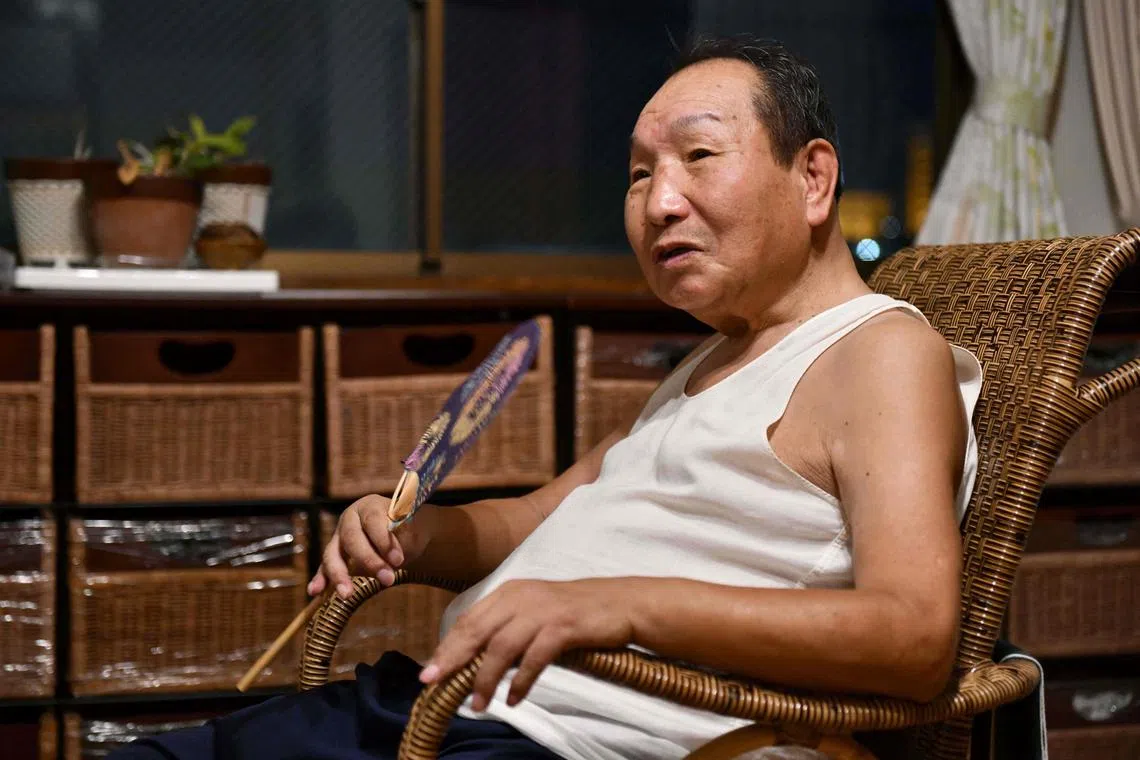
Mr Iwao Hakamada, seen here in 2018, was convicted in 1968 of killing his boss, the man’s wife and their two children.
PHOTO: AFP
“The prosecution’s records were obtained by effectively infringing on the defendant’s right to remain silent, under circumstances extremely likely to elicit a false confession,” the ruling said.
Hundreds of people queued in the morning to try to secure a seat for the verdict in a murder saga that has gripped the nation and sparked scrutiny of Japan’s justice system.
Prosecutors have two weeks to appeal, according to local media.
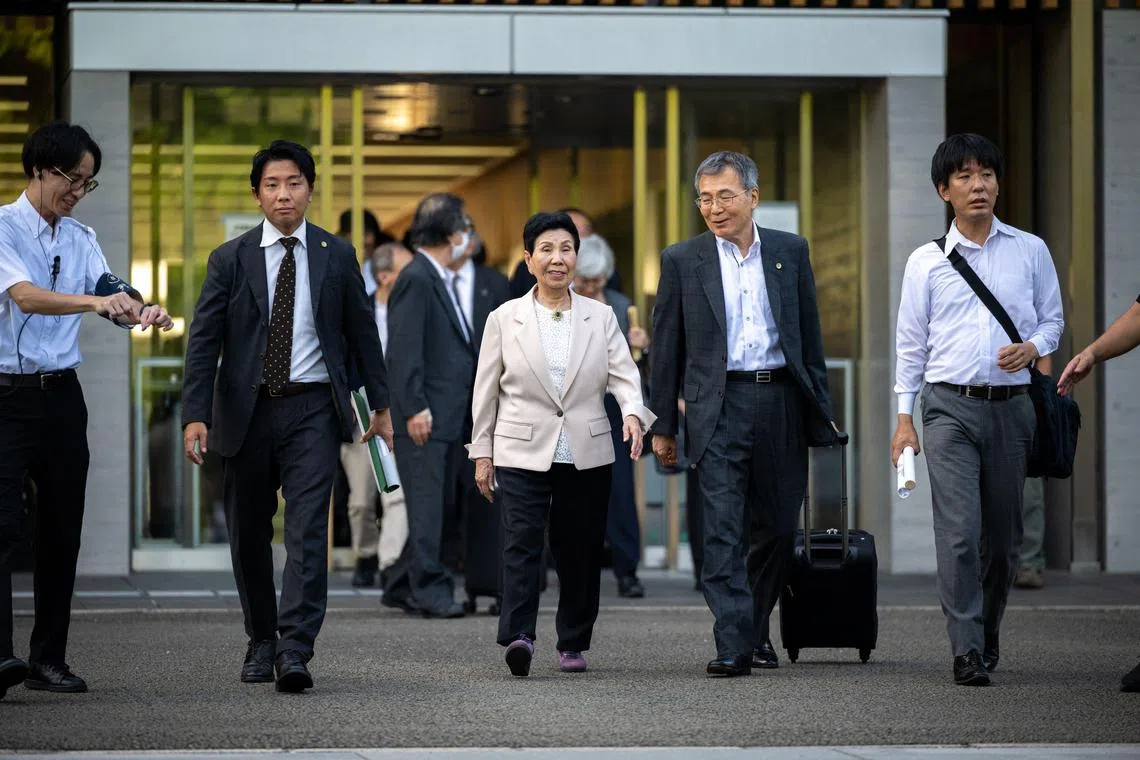
Ms Hideko Hakamada (centre), sister of Mr Iwao Hakamada, leaving the Shizuoka District Court on Sept 26, 2024.
PHOTO: AFP
“I went to the prosecutors’ office and said ‘don’t force us to fight until I turn 100’,” Ms Hakamada said before the verdict.
She wore a white jacket and, asked if it symbolised her brother’s innocence, said she had deliberately avoided dark colours.
‘A bout every day’
Capital punishment has broad public support in Japan.
Mr Hakamada is the fifth death row inmate granted a retrial in Japan’s post-war history. All four previous cases resulted in exoneration.
His lead lawyer Hideyo Ogawa said Mr Hakamada sometimes seems like he “lives in a world of fantasy” after decades of detention, mostly in solitary confinement.
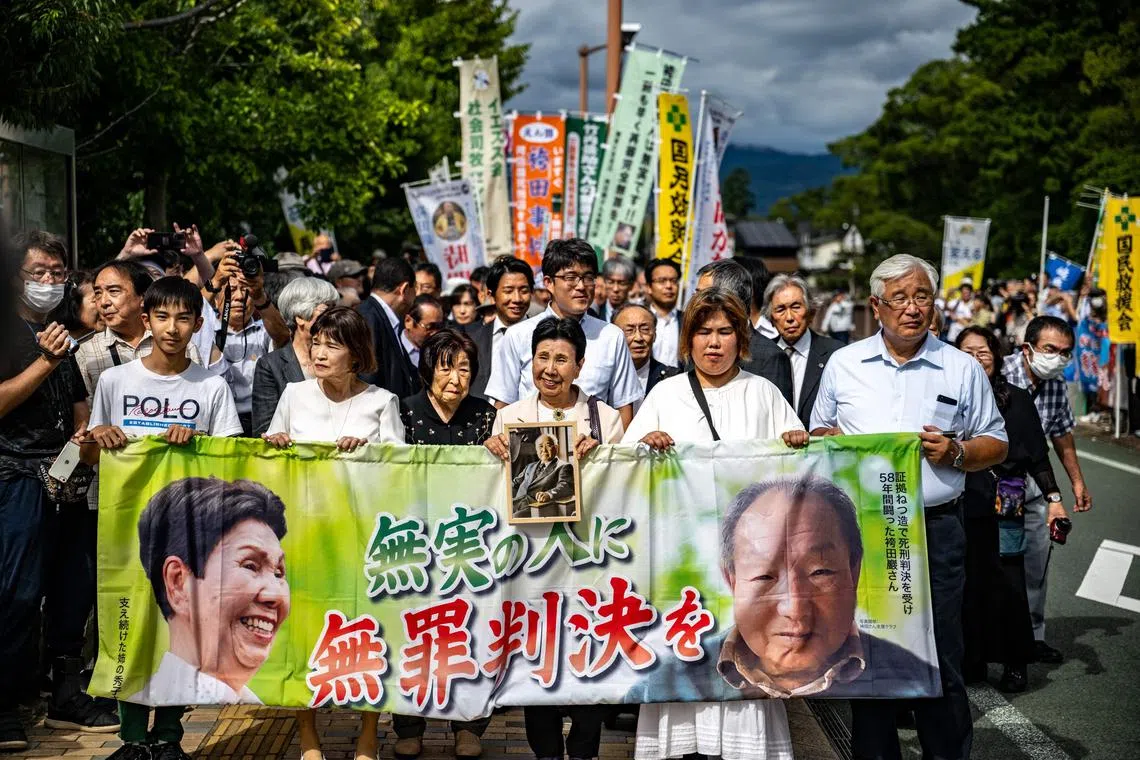
Ms Hideko Hakamada (centre) holding a banner reading “innocent man, not guilty verdict” to support her brother Iwao Hakamada.
PHOTO: AFP
Describing his battle to obtain an acquittal to AFP in 2018, Mr Hakamada said he felt he was “fighting a bout every day”.
“Once you think you can’t win, there is no path to victory,” he said.
Mr Hakamada appeared not to be immediately aware of the decision, after Japanese media reported that supporters had removed the batteries from his TV remote control on Sept 26.
Ms Hakamada had told reporters she wanted to tell him the news soon after the verdict, but at the right moment.
He was filmed shortly after the decision leaving home to go for a walk, dressed in a short-sleeved shirt and a green hat.
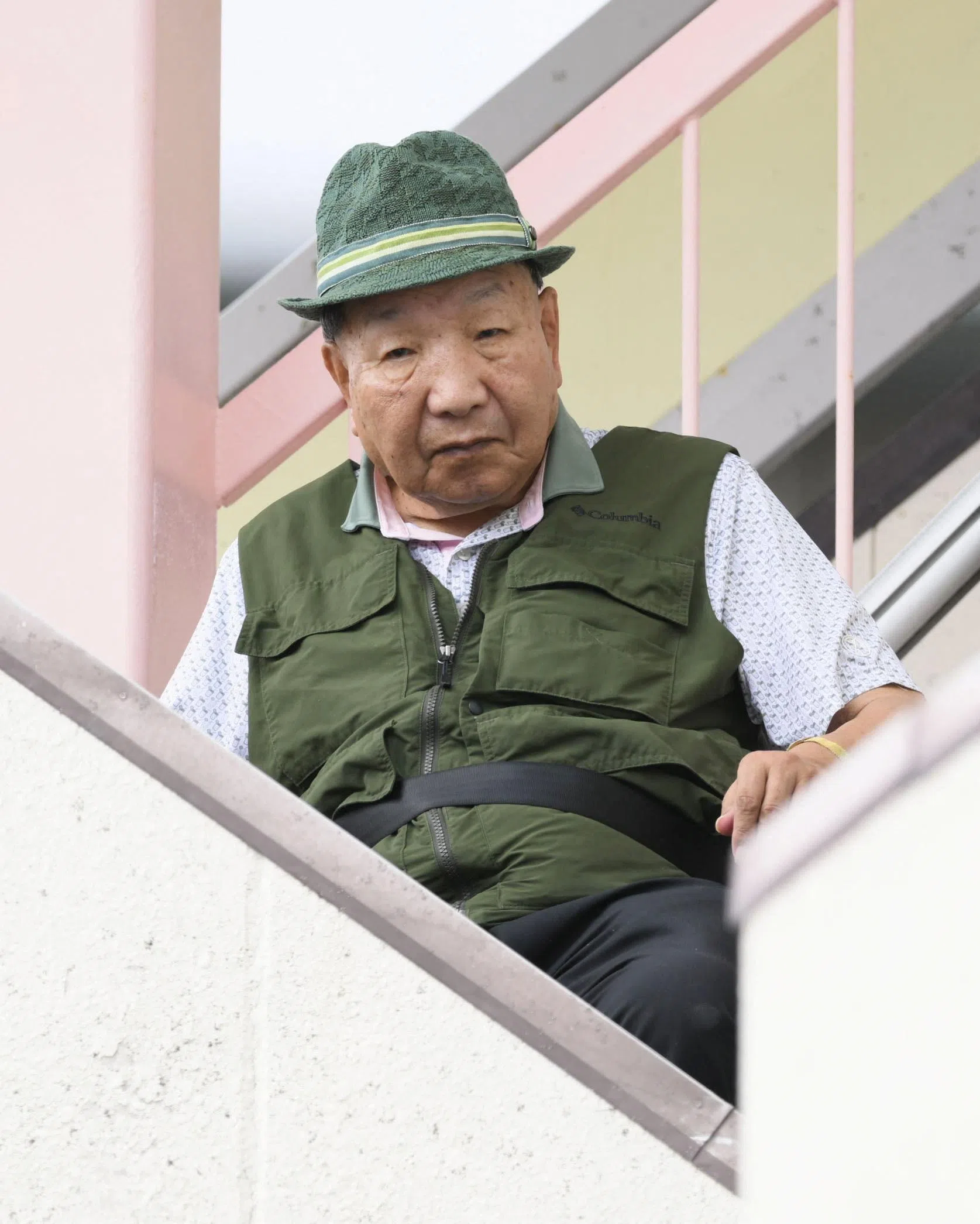
Mr Iwao Hakamada, 88, leaving home for a stroll in Hamamatsu, central Japan, on Sept 26, 2024.
PHOTO: KYODO VIA REUTERS
‘Hostage justice’
The Supreme Court upheld Mr Hakamada’s death sentence in 1980, but his supporters kept up the fight to reopen the case.
A turning point came in 2014 when a retrial was granted and Mr Hakamada was released from prison.
However, legal wrangling, including a pushback by prosecutors, meant it took until 2023 for the retrial to begin.
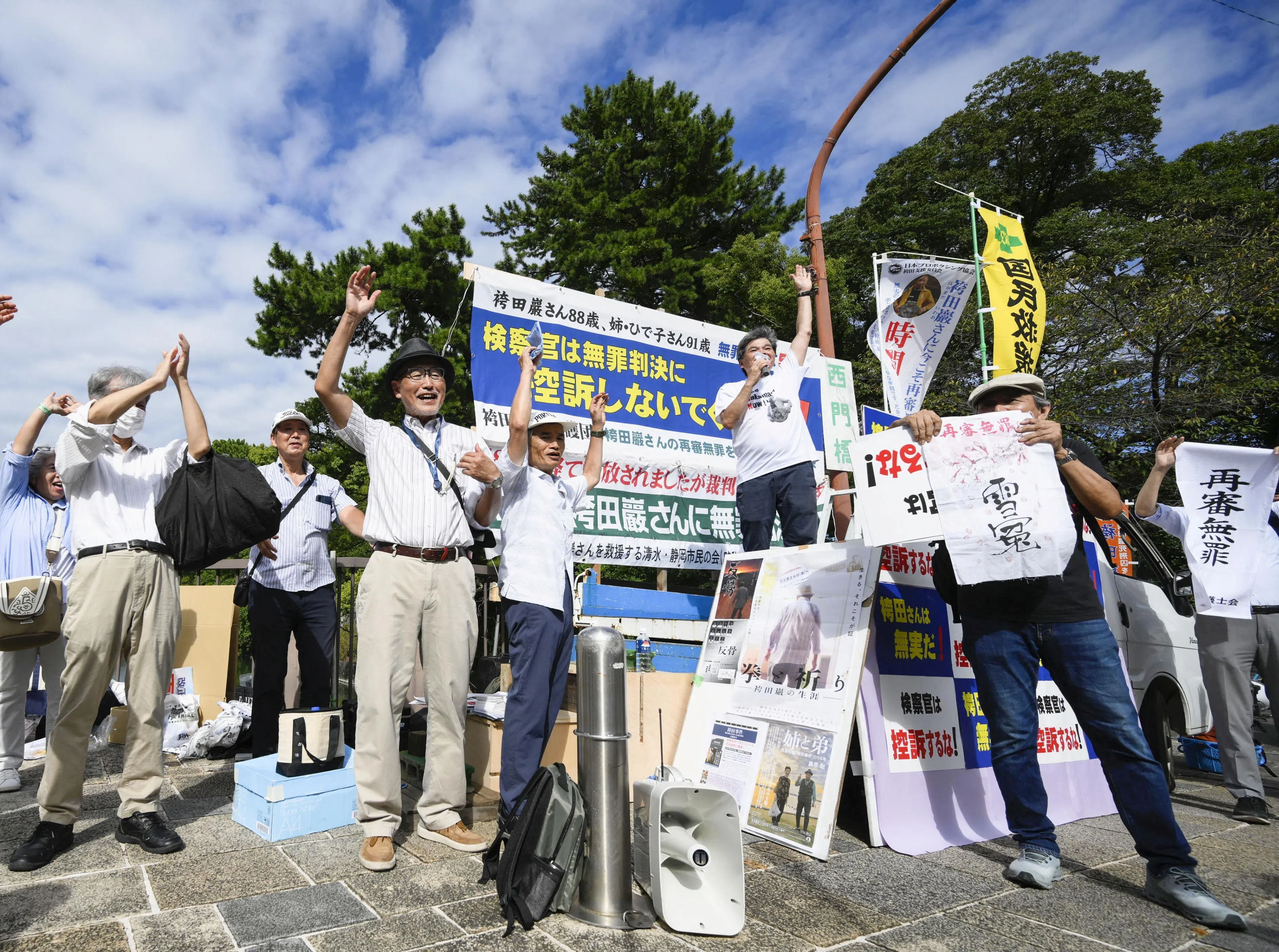
Supporters of Mr Iwao Hakamada celebrating after the Shizuoka District Court acquitted the 88-year-old former professional boxer in a retrial decades after he was sentenced to death over a 1966 quadruple murder case, in Shizuoka, central Japan, on Sept 26, 2024.
PHOTO: KYODO VIA REUTERS
“For so long, we have fought a battle that has felt endless,” Ms Hakamada said in July.
Mr Hakamada initially denied having robbed and murdered the victims in 1966.
But he then confessed following what he later described as a brutal police interrogation that included beatings.
Supporter Atsushi Zukeran, wearing a T-shirt saying “Free Hakamada Now”, said outside the court that the case was “a painful reminder of how Japan’s criminal justice system must change”.
Given how long the affair dragged on, “part of me wouldn’t be able to celebrate the acquittal entirely”, Mr Zukeran said.
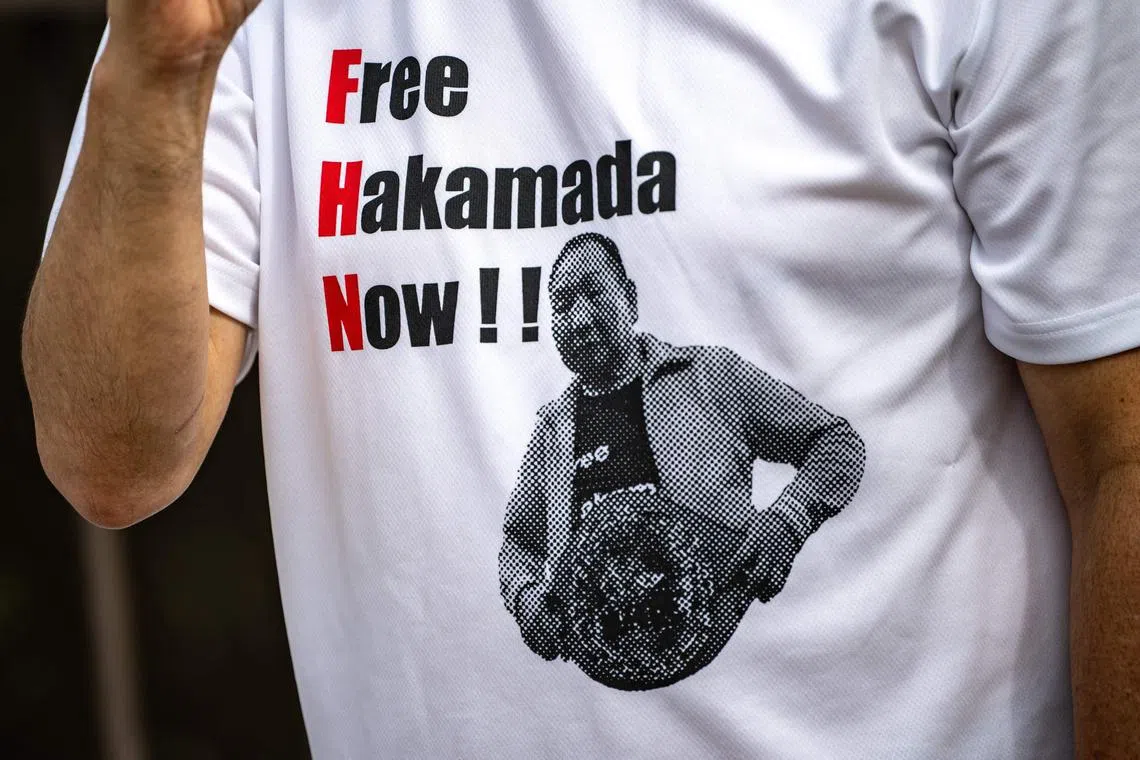
A supporter of Mr Iwao Hakamada outside the Shizuoka District Court on Sept 26, 2024.
PHOTO: AFP
Mr Hakamada’s case is “just one of countless examples of Japan’s so-called ‘hostage justice’ system”, Mr Teppei Kasai, Asia programme officer for Human Rights Watch, told AFP.
Amnesty International said it was “overjoyed” by the outcome.
“After enduring almost half a century of wrongful imprisonment and a further 10 years waiting for his retrial, this verdict is an important recognition of the profound injustice he endured for most of his life,” said the group’s East Asia researcher Boram Jang. AFP


